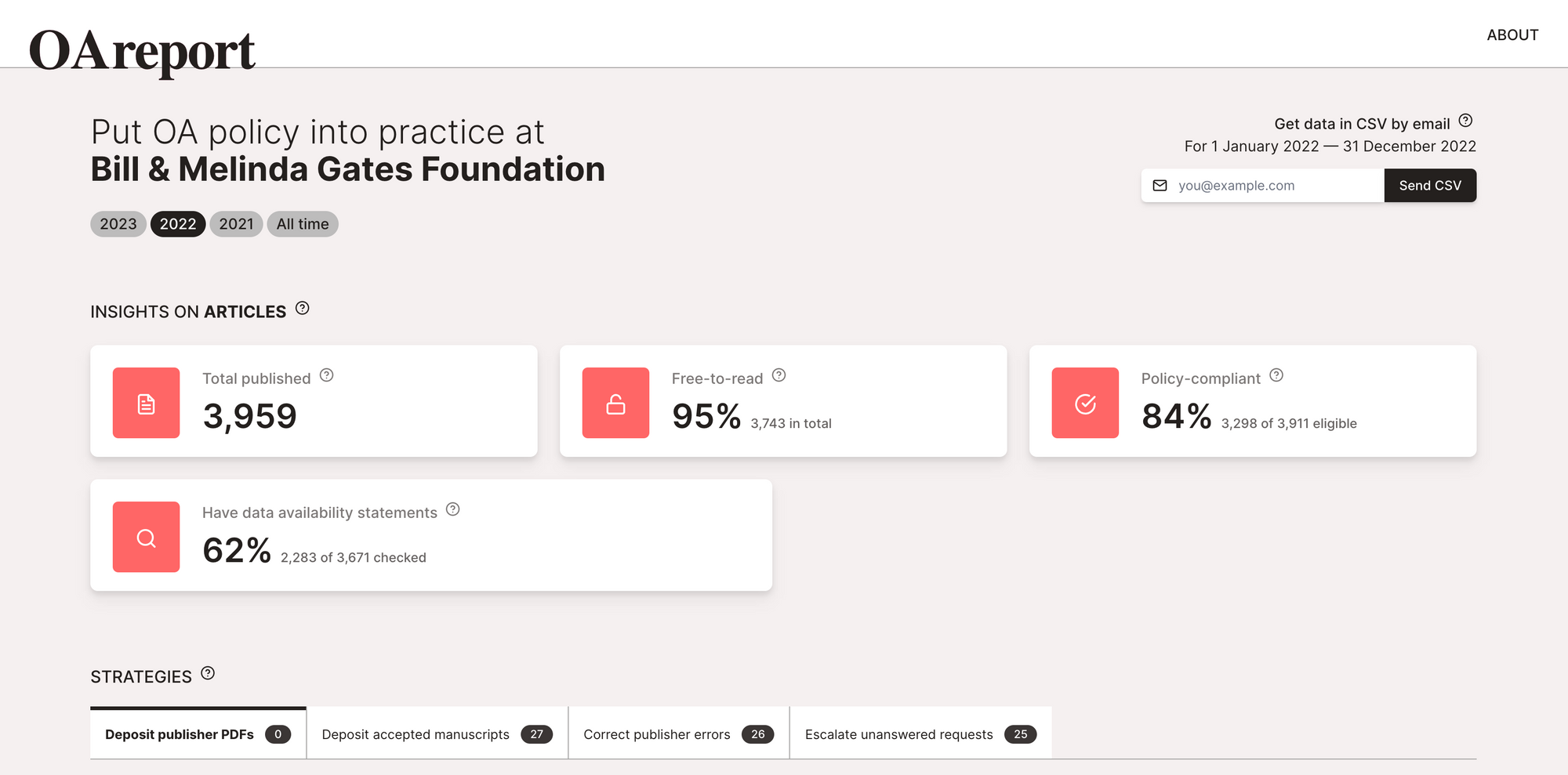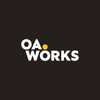OA.Report helps funders measure and increase OA policy compliance and their investment’s impact
Available to more organizations later this year.

OA.Report is an open-source tool that identifies research outputs organizations have supported, analyzes their openness (including OA policy compliance), and then streamlines taking action to make results more open. We’ve built OA.Report in partnership with the Gates Foundation and are thrilled it’s now also in use at the Robert Wood Johnson Foundation, Aligning Science Across Parkinson’s, and Templeton World Charity Foundation, which also financially support the project. As we work to make the tool available to more people, we want to share some of the progress we’ve made. If you’d like to get early access to OA.Report, sign up for updates:
In 2020 we started to build OA.Report with the goal of helping organizations discover, analyze, and unlock papers covered by OA policies. In 2022, it was terrific to see our users start realizing their goals with our support. We were proud to share some of their stories during Open Access Week.
As we’ve collaborated with users, our work has expanded to include helping organizations analyze and increase their research output, OA policy compliance, and impact. Some results we’re particularly proud of include the following:
- Significantly improving article tracking: The Gates Foundation discovered 40% more foundation-supported articles than they’d previously tracked. Others have also uncovered a significant number of previously untracked articles.
- Providing greater insight into publishing and impact metrics: Building on systems we built to measure OA policy compliance, we are able to provide funders with insight into a range of questions, such as what types of OA journals their authors are using, how many citations their funded work has, and which other funders are supporting the same work they are.
- Providing clean grant ID data: OA.Report provided clean grant IDs for more than 70% of articles (or an author affiliation). We were then able to match grant programs to articles to provide program-level assessments of publishing, OA compliance, and impact.
- Measuring historically unmeasured research outputs: For instance, OA.Report can track rates of preprinting, how many papers have data availability statements, and how many have associated open data and code.
- Sharing what we’ve learned with the community: We were excited to feed into the Open Research Funders Group research output tracking report and use OA.Report in a talk hosted by the UN library to help launch a new collaboration to unlock climate papers.
The Gates Foundation has made more than 200 articles from the past two years more open through strategies enabled by OA.Report. For example, OA.Report created customized, read-to-send emails for the foundation so it could ask authors to self-archive their paywalled paper in a repository. After 380 requests, 50% of authors unpaywalled their work, with many authors self-archiving more papers than requested. Even where authors didn’t share their work, there were still gains that could be built upon. The links in our emails were opened in 85% of our emails, which means we’re confident the vast majority of authors contacted were educated about the policy, their article's status, and how to comply. A holistic approach enabled these results, with OA.Report making it easy for foundation staff to take action, ShareYourPaper and the Rights Retention Strategy making it easy for authors to comply, and OA.Support making it easy to follow up and provide support for any remaining challenges.
OA.Report works by providing a dashboard, updated daily, with key insights shown and one-click actions to take. We also provide in-depth analytics spreadsheets and clean raw data (as a CSV, and API) on your outputs. What makes these special is that OA.Report:
- Can be customized by our expert team to support your goals. This includes your insights, in-depth analytics, actions, and more, without your team needing to learn a new tool or carry out days of quality assurance.
- Organizes and brings together open scholarly metadata from several sources, your internal data, and data we collect. In 2023, we’ll infer information (like grant IDs) even when it's not in the article text or metadata.
In 2023, we’re planning to expand the functionality of OA.Report. What we’re working on is driven by what our users need. Of particular interest to us are the following:
- Discovering hard-to-find outputs: We hope to implement many of our ideas for improving our ability to identify funding attributions behind paywalls;
- Improving our compliance analysis: We’re working on using article submission dates to guide inclusion, as well as exclusion, of reviews, commentaries, and other non-peer-reviewed content from the analysis;
- Enabling proactive action: We’d like to encourage culture change by helping identify potential champions of certain behaviors (say, preprinting and sharing data) in their community;
- Working with other types of funders and libraries: While our initial users have all been private foundations, our design and consultation process has included universities (especially their libraries) and governments. We’re excited about expanding OA.Report to help support these institutions with compliance as well.
After two years of building and testing OA.Report, we’re excited to start inviting more people to use it. If you’d like to get early access, sign up for updates:
Ashley Farley, Program Officer of Knowledge and Research Services at the Bill & Melinda Gates Foundation, summarizes our progress so far:
"As manager of the open access policy I feel the policy can only be as successful as the ability to spot non-compliance and enact corrections. This requires copious data sources and a way to translate these sources into action. This is what OA.Report accomplishes. Being able to assess the strengths and weaknesses of open access policy compliance easily and in real time ensures its success.
Grant support for this work was provided in part by the Bill and Melinda Gates Foundation and the Robert Wood Johnson Foundation. The views expressed here do not necessarily reflect the views of either foundation.

